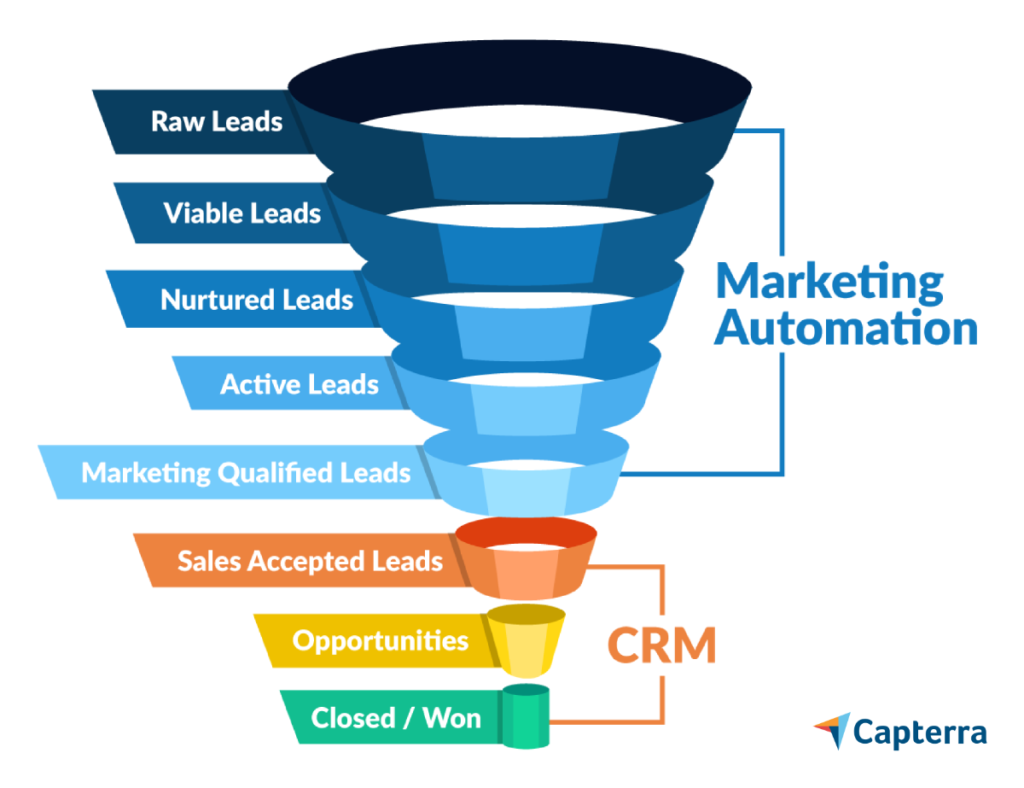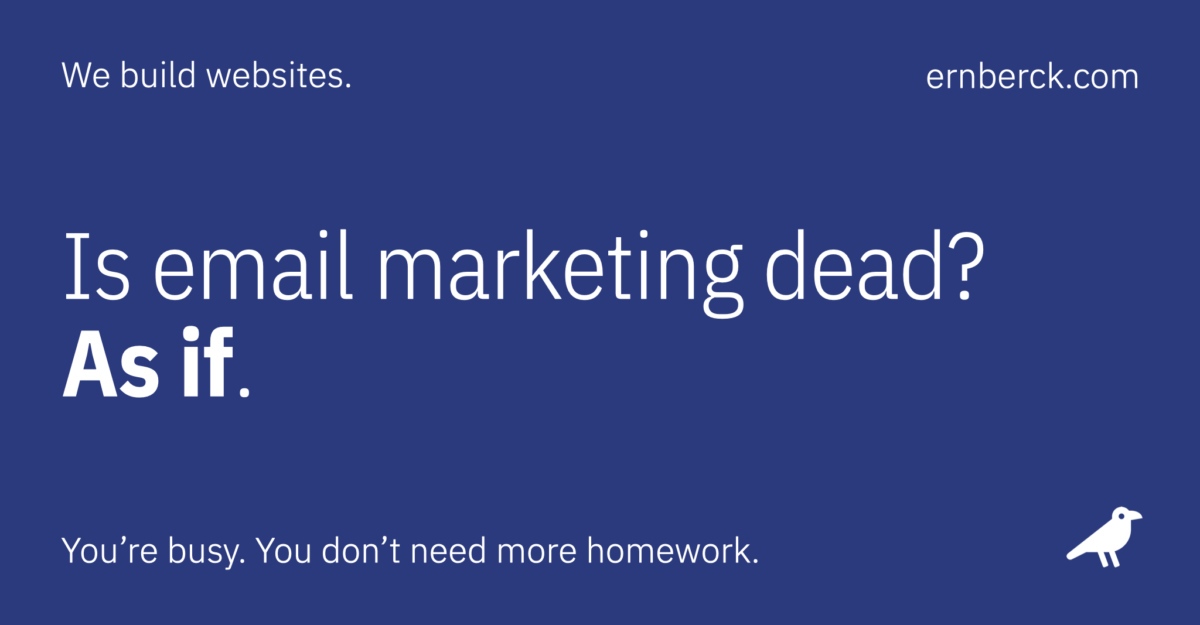Despite all the hype about TikTok, Facebook ads and YouTube videos, there’s still no better way to connect with your customers and grow your business than through email marketing. Yet the vast majority of businesses aren’t using it effectively.
Own your audience
On any other platform, whether it’s Instagram, YouTube, Facebook, or even Google search results, you don’t own your audience — they do. They control who sees your content and who doesn’t. And, when they decide to change their policies, strategies or algorithms, you could be toast.
With email, you own your list. When someone signs up and willingly gives you their email address, you get to keep it. You can contact customers and prospects directly using personal information they freely gave to you.
Plus, if you ever decide you don’t like your email marketing software, you can just download your list and move to a different platform. Your audience goes with you.
So, what is email marketing?
Email marketing is the act of sending a commercial message, typically to a group of people, using email. In its broadest sense, every email sent to a potential or current customer could be considered email marketing.
Common email marketing objectives include:
- Encourage customer loyalty
- Share company news
- Establish trust
- Enhance brand awareness
- Acquire new customers
- Persuade customers to purchase
- Upsell current customers
How does email marketing work?
In general, there are two different types of software used to collect and manage customer email lists:
- Email marketing software
- Customer relationship management (CRM) software
Both systems are typically offered as “software as a service” (SaaS) solutions. That is, the platform is hosted by the vendor online as a subscription service, instead of running on your desktop computer.
There’s some functionality overlap between the two systems, but in essence, email marketing software is primarily “lead generating,” and CRMs are “lead nurturing.” Let’s try to de-mystify both options.
Is it “email marketing” or “marketing automation”?
Most popular email marketing systems used today also include some level of “automation” functionality that can send email according to very specific customer behaviors, tags and triggers. Hence, most of these programs could more accurately be described as “marketing automation software.”
For the sake of clarity, we’ll stick with the more traditional “email marketing software” label — Just be aware that most of the systems we’re referring to also include some robust automation capabilities.

Ben Chestnut / CEO Mailchimp
“Twitter is a company. Facebook is a company. Email is a communications medium. Email endures because it adapts, and it adapts because it’s not owned by any one individual or any company.”
Email marketing vs CRM
As mentioned above, the main difference between these software types is who they target:
- Email marketing software: Marketing-focused (lead generation)
- CRM software: Sales-focused (lead nurturing)
Email marketing software generates customer leads and helps get them ready for your sales team. Once the lead progresses to the bottom of the sales funnel (see diagram below) and becomes a qualified sales lead, a company will typically start tracking interactions with a CRM tool.
A few years ago there were more clearly defined distinctions between all these software packages. Today, not so much. Sophisticated CRM systems now include powerful email automation tools and tracking. And many email marketing tools are beginning to integrate basic CRM functionality.
For example, Mailchimp — originally a dedicated email marketing system — has recently added some simple CRM functionality making it an effective (and affordable) choice for a lot of small businesses.
Email marketing systems allow companies to:
- Schedule and send mass business-to-customer (one to many) email marketing campaigns
- Target, automate, and measure email marketing campaign results
- Use groups, segments, tags, and behaviors to trigger custom email message delivery
- Send automated newsletters triggered by RSS feed changes
- Create targeted email “drip” campaigns based on customer activity
CRM systems allow companies to:
- Collect, store, organize, and display customer contact history
- Manage and display customer purchase history
- Manage and display customer email communication
- Store, organize and display dates and notes of any client phone conversations
The customer journey
These two systems can also be distinguished by where their processes fall in the overall customer journey (or sales funnel):

Image copyright © Capterra.
Do I need both systems?
Probably not. In fact, most small businesses should start with a simple email marketing system (Mailchimp, Constant Contact, ConvertKit, etc) to see if it’s something that they can effectively manage on a daily basis.
If you reach the point where you’ve got several salespeople and hundreds of clients in your sales “pipeline,” you might consider adding a CRM (Zoho CRM, Hubspot, Salesforce, etc). Most marketing automation solutions let you sync your data with your CRM so all of a prospect’s activities are accessible through one solution.
If you don’t want to buy two separate systems, many CRM vendors have developed or acquired marketing automation software, so there are a few systems out there that include the functionality of both.
Consider your resources
Keep in mind that all digital marketing systems (especially CRMs) require a lot of work to configure, implement and manage. Most require daily maintenance by someone familiar with not only the software, but with the company’s policies, strategies and marketing goals.
In other words, who in your organization is going to be maintaining and updating your email marketing system on a regular basis? If you don’t have the budget, time, inclination or staff to sustain such a system, you haven’t solved a problem; you’ve created one.
The benefits of email marketing
Much has changed with email marketing systems in the last few years. In addition to a lot more vendors in this space, the technology continues to get more elaborate and complex. But if you can navigate the provider maze — and find a suitable solution — there are a number of benefits.
Broad reach: Email messages can reach a large number of people in a very short time — Including those who may not be actively looking for products or services.
Cost-effective: Email marketing can be an economical way to reach a large audience, and can generate a high return on investment (ROI) compared to other marketing channels.
Targeted: Email messages can be personalized and targeted to specific segments of your customer base.
Shareable: Emails can be easily shared with others, increasing the potential reach of the marketing message.
Measurable: Email marketing provides measurable results, such as open rates, click-through rates, and conversions. This lets you easily track and measure the success of your email campaigns.
Builds relationships: By providing valuable content and offers, businesses can build relationships with their customers and keep them engaged with the brand.
The drawbacks of email marketing
Depending on your industry, audience, and available resources (time, money, staff), there can be a few drawbacks to email marketing.
Technical problems: Technical snags, such as broken links or images, can prevent emails from being properly displayed. This can negatively impacting the effectiveness of your campaign.
Low engagement rates: Even if you achieve high email open rates, the click-through rate of email campaigns can be low, meaning that not all recipients are taking the desired action.
Spam filters: Some email messages may not reach the intended recipient due to spam filters, which can limit the effectiveness of the campaign.
Lack of attention: We’re all getting a little numb to the volume of email we receive. It can be difficult to grab a recipient’s attention and get them to engage with your message.
Privacy issues: Email addresses can be easily shared and sold, leading to increased privacy concerns for consumers (see CAN-SPAM Act below).
List decay: Over time, subscriber email addresses can become inactive or obsolete, decreasing the effectiveness of your campaigns.
Hard work: Creating and executing effective email marketing campaigns can be time-consuming and resource intensive. Be ready to invest heavily in technology, design, copywriting, and testing.
The CAN-SPAM Act
Before you get goosebumps dreaming of all the folks you’re going to blast with your first email campaign, we need to address the elephant in the room — Who you can and can’t send marketing email to. This is not only an ethical issue, but a legal one as well.
The Controlling the Assault of Non-Solicited Pornography and Marketing (CAN-SPAM) Act of 2003 became law on January 1, 2004. The act established the first national standards in the United States for the sending of commercial email, and requires the Federal Trade Commission (FTC) to enforce its provisions. According to the FTC, if you violate the law, you could be fined $11,000 for each offense — that’s $11,000 for each email address on your list.
Internet service providers around the country have successfully sued spammers for millions of dollars under this law. If you send commercial email (generally sales or promotional content), you should familiarize yourself with the requirements of the CAN-SPAM act.
A few key points of the law include:
- Never use deceptive headers, from names, reply-to addresses, or subject lines
- Always provide an unsubscribe link
- The unsubscribe link must work for at least 30 days after sending
- You must include your physical mailing address
There are no restrictions against a company emailing its existing customers or anyone who has inquired about its products or services. This is permitted even if these individuals have not given permission, because these messages are classified as “relationship” messages under CAN-SPAM.
However, when sending unsolicited commercial emails, it must be stated that the email is an advertisement or a marketing solicitation. Recipients who have signed up to receive commercial messages from you are exempt from this rule.
If a user opts out, a sender has 10 days to cease sending and can use that email address only for compliance purposes. The legislation also prohibits the sale or other transfer of an email address after an opt-out request.
Compliance is critical
Just because the CAN-SPAM act allows you to pester existing customers, that doesn’t mean that you should. In fact, the ultimate authority on who you can contact via email will be the email marketing or CRM vendor that you choose.
Remember, you’re using their hardware, software, domains, and IP addresses to send mass email campaigns on your behalf. If you jeopardize their reputation your account will be terminated without hesitation. This happens daily, so don’t even think of doing anything hinky.
To get an idea of what marketing email vendors allow and expect, take a look at Mailchimp’s Examples of Compliant and Non-Compliant Lists. It’s a comprehensive look at what you can and can’t do on their platform. All reputable vendors will have similar guidelines. Violate them at your own risk.
Postscript
Email marketing is an online strategy that involves sending promotional or informational email messages to a broad, carefully-built list of potential customers. It’s imperative that recipients have opted in (given permission) to receive these messages.
For many businesses, the cost, reach, and ability to measure results make email messaging a valuable part of their overall marketing strategy. However, you also have to consider the challenges and limitations of email marketing — Including low open and click-through rates, spam filters, and privacy concerns.
The ultimate goal is to build relationships with customers, promote products or services, and drive conversions and sales. Email marketing can be highly targeted, personalized, and cost-effective. For a lot of organizations, it can be a powerful tool to reach and engage an audience.
Related
- A Facebook page is not a website
- Content marketing still works
- Email is hard
- The truth about inbound marketing
Sources
- CAN-SPAM Act: A Compliance Guide for Business
- Capterra
- Mailchimp
- Salesforce
- Wikipedia: CAN-SPAM Act of 2003
- Wikipedia: Purchase funnel
Revised: Wednesday February 1, 2023 at 12:58:02 PM PST
